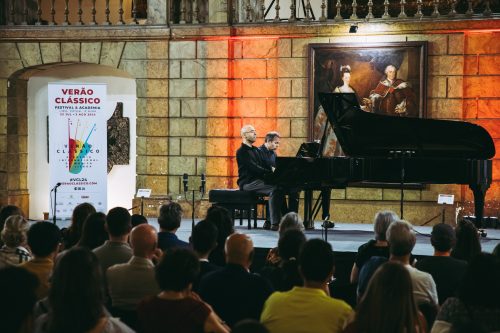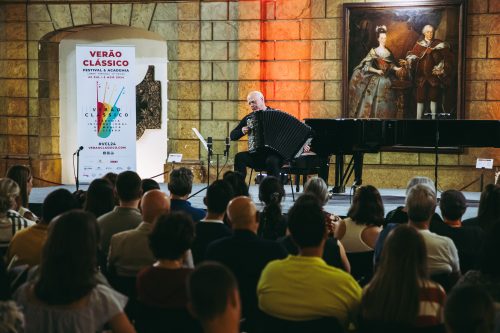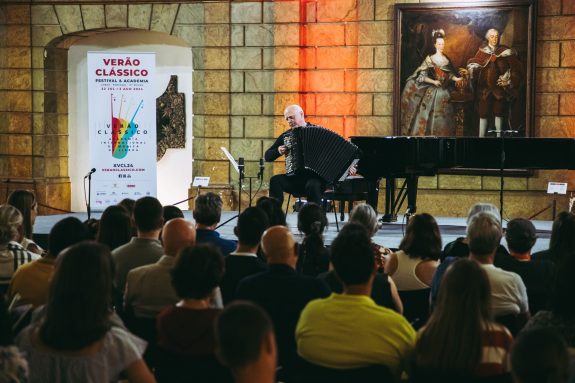 Portugal Verão Clássico Festival 2024 [2] – MasterFest Concert II: Stephan Picard, Eszter Haffner (violins), Miguel da Silva (viola), Patrick Demenga (cello), Janne Saksala (double bass), Geir Draugsvoll (accordion), Eldar Nebolsin, Filipe Pinto-Ribeiro (piano). Museu Nacional dos Coches, Lisbon, 27.7.2024. (LV)
Portugal Verão Clássico Festival 2024 [2] – MasterFest Concert II: Stephan Picard, Eszter Haffner (violins), Miguel da Silva (viola), Patrick Demenga (cello), Janne Saksala (double bass), Geir Draugsvoll (accordion), Eldar Nebolsin, Filipe Pinto-Ribeiro (piano). Museu Nacional dos Coches, Lisbon, 27.7.2024. (LV)

Bach – ‘Allein Gott in der Höh sei Her’, BWV 711; ‘Actus Tragicus’ (‘Gottes Zeit ist die allerbeste Zeit’), BWV 106 (transcriptions by György Kurtág)
Schubert – Fantasie in F minor, D 940 (for piano four hands)
Sofia Gubaidulina – ‘De Profundis’
Dvořák – Quintet No.2 in G major, Op.77
Two very different works dominated the program Saturday night at the Verão Classical Festival in Lisbon: Schubert’s bittersweet Fantasy in F minor for piano four hands and Sofia Gubaidulina’s magnificent, roaring ‘De Profundis’ for accordion. In every aspect of tone and texture they are complete opposites, and yet both opened celestial windows.
The Schubert was immediately marked by the ability of Filipe Pinto-Ribeiro and Eldar Nebolsin to create clouds of sound from the simple opening chords which then dispersed into the formal outlines of the music. It was not just sad, dreamy Schubert but charged with life-enhancing beauty. And though their waltz seemed quick, the toy piano effect had more substance than usual and, when the opening came around again, it was shrouded in mystery.
The ending was infused with both warmth and the dissonant tension that characterizes so much of presumably non-dissonant classical music. It was further enhanced by the capacity of the two pianists to attack the final discord boldly but not violently. When a friend in the audience suggested that it was ‘Schubert by Rachmaninoff’, there was a slight kernel of truth: both pianists have roots in old-fashioned romanticism, but together they fashioned something simple and profoundly free of personality.
Sofia Gubaidulina’s ‘De Profundis’ took its title from Psalm 130, ‘From the depths, O Lord, I cry to you’ and, like the Fantasy, seeks glimpses of heaven through accumulations and aggregations of sound. It is not, however, a pretty work. Indeed, most of its 13 minutes growl, shake, rattle and roll with all the monstrous symphonic majesty that the modern accordion is capable of, ranging from the tortured breathing of a beached whale and the distressed amatory cries of its partner to the last hushed entrance into celestial realms.

The piece might have been written for Geir Draugsvoll, so complete was the identification and powerfully theatrical his presentation. His recording on BIS remains the touchstone for finding the music’s emotional heart without compromise.
The concert opened with two of György Kurtág’s Bach arrangements which Nebolsin and Pinto-Ribeiro played with crystalline purity. The changes from the original are, for the most part, subtly undetectable, but there is a definite feeling that you know the music and yet do not know it – especially in the ‘Actus Tragicus’ – but want to know it better.
The night closed with Dvořák’s big and endearing, if somewhat cumbersome, Quintet for string quartet and double bass, a work of extraordinary consequence in the composer’s artistic life and a signal contributor to his artistic development. In its four spacious movements. Dvořák poured his heart into music that matched Brahms for luxury of invention and sumptuousness of sound. The incongruously obscure and sublime Poco andante, once heard, remains a treasure.
The performance was the kind of music-making you only hear at festivals, strong and passionate with little room for the subtleties that occur when rehearsal time is unlimited. But with Stephen Picard’s muscular strokes, Patrick Demenga’s flashes of thrilling virtuosity and Janne Saksala’s discreet leadership showing why he is principal bass in the Berlin Philharmonic, the result was sheer, occasionally outrageous, joy.
Laurence Vittes
